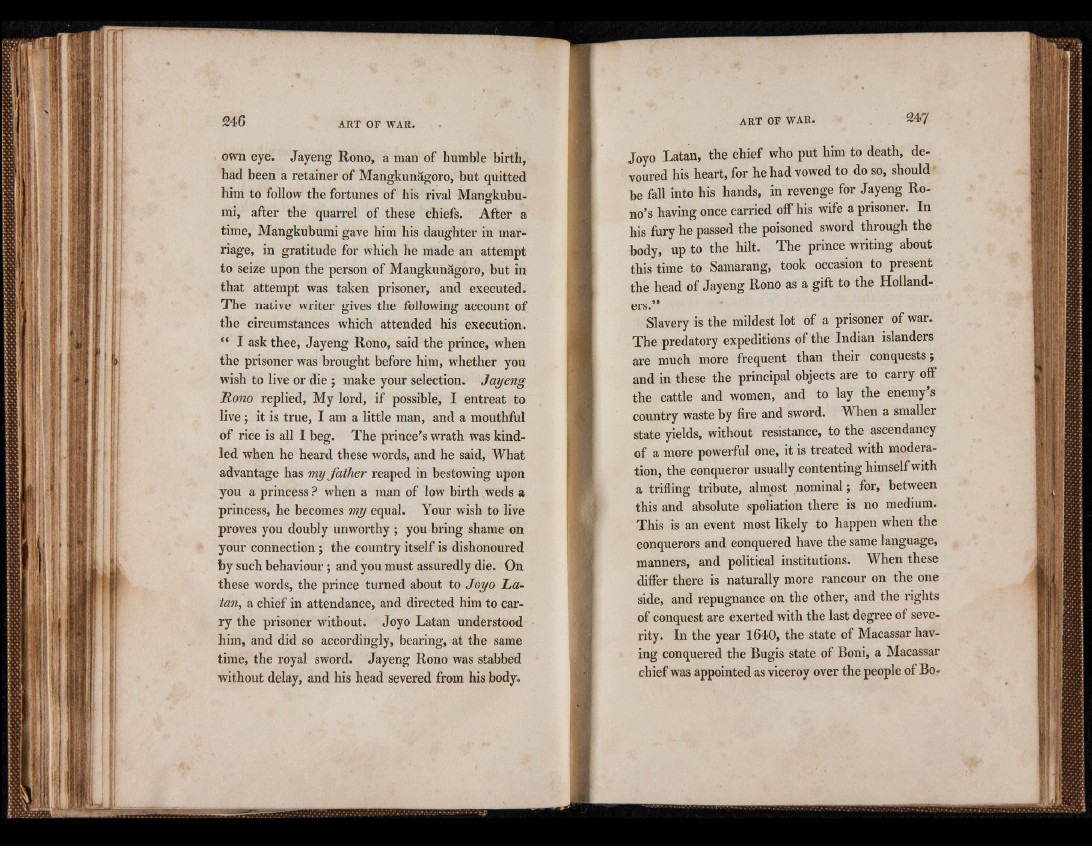
own eye. Jay eng Rono, a man of humble birth,
had been a retainer of Mangkunagoro, but quitted
him to follow the fortunes of his rival Mangkubu-
mi, after the quarrel of these chiefs. After a
time, Mangkubumi gave him his daughter in marriage,
in gratitude for which he made an attempt
to seize upon the person of Mangkunagoro, but in
that attempt was taken prisoner, and executed.
The native writer gives the following account of
the circumstances which attended his execution.
“ I ask thee, Jay eng Rono, said the prince, when
the prisoner was brought before him, whether you
wish to live or die j make your selection. Jay eng
Rono replied, My lord, if possible, I entreat to
live; it is true, I am a little man, and a mouthful
of rice is all I beg. The prince’s wrath was kindled
when he heard these words, and he said, What
advantage has my father reaped in bestowing upon
you a princess ? when a man of low birth weds a
princess, he becomes my equal. Your wish to live
proves you doubly unworthy ; you bring shame on
your connection j the country itself is dishonoured
by such behaviour; and you must assuredly die. On
these words, the prince turned about to Joyo La-
tan, a chief in attendance, and directed him to carry
the prisoner without. Joyo Latan understood
him, and did so accordingly, bearing, at the same
time, the royal sword. Jayeng Rono was stabbed
without delay, and his head severed from his body.
Joyo Latan, the chief who put him to death, devoured
his heart, for he had vowed to do so, should
be fall into his hands, in revenge for Jayeng Ro-
no’s having once carried off his wife a prisoner. In
his fury he passed the poisoned sword through the
body, up to the hilt. The prince writing about
this time to Samarang, took occasion to present
the head of Jayeng Rono as a gift to the Hollanders.”
Slavery is the mildest lot of a prisoner of war.
The predatory expeditions of the Indian islanders
are much more frequent than their conquests;
and in these the principal objects are to carry off
the cattle and women, and to lay the enemy’s
country waste by fire and sword. When a smaller
state yields, without resistance, to the ascendancy
of a more powerful one, it is treated with moderation,
the conqueror usually contenting himself with
a trifling tribute, almost nominal; for, between
this and absolute spoliation there is no medium.
This is an event most likely to happen when the
conquerors and conquered have the same language,
manners, and political institutions. When these
differ there is naturally more rancour on the one
side, and repugnance on the other, and the rights
of conquest are exerted with the last degree of severity.
In the year 1640, the state of Macassar having
conquered the Bugis state of Boni, a Macassar
chief was appointed as viceroy over the people of Bo